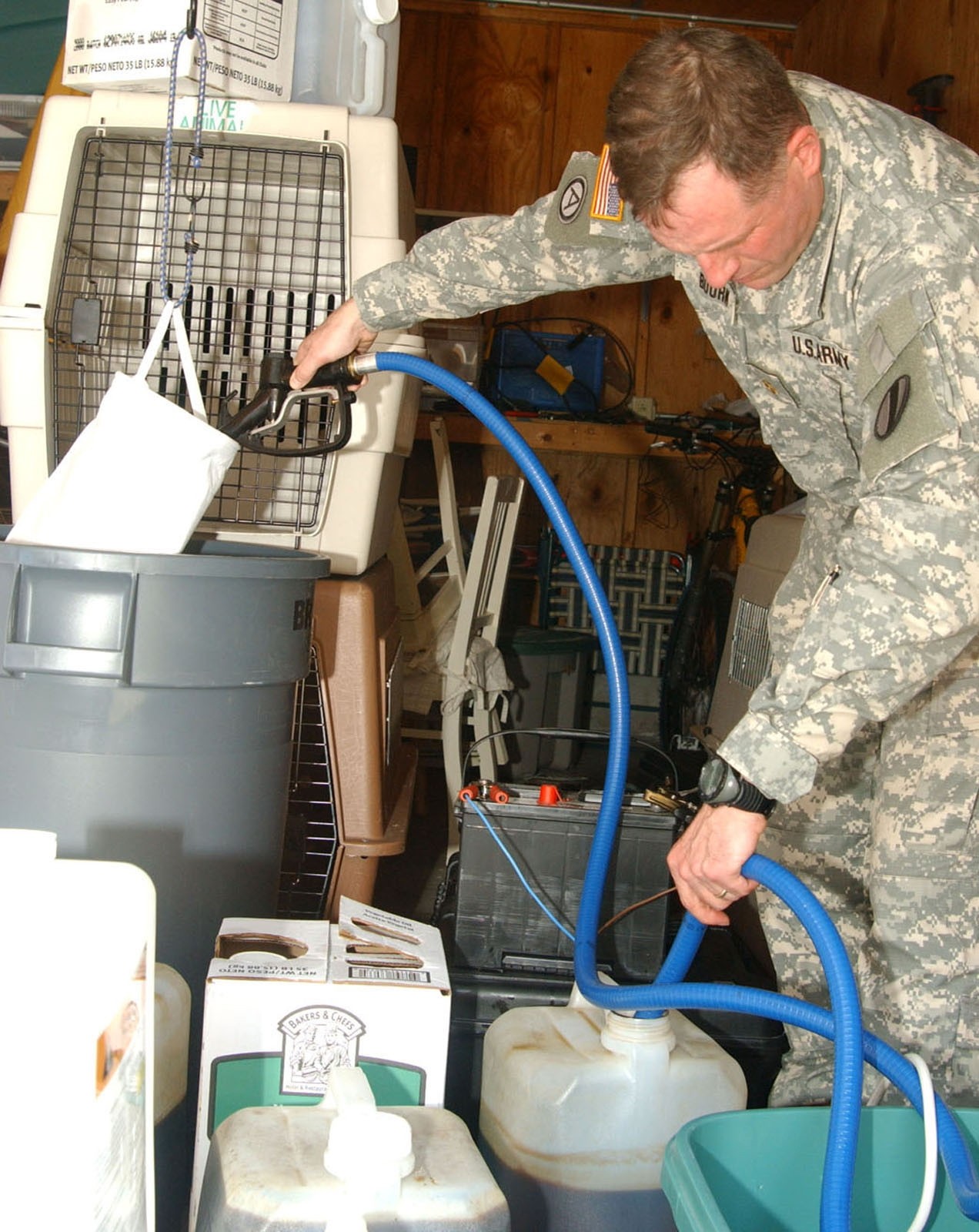FORT MONROE, Va. (Army News Service, April 11, 2007) - Drooling over a tricked-out truck isn't unusual for many American males.
But salivary glands spring into action for an entirely different reason when a particular Dodge pickup drives around this post ... it emits the yummy smell of fried food.
Its fuel is cooking oil.
The blue and white truck, which belches out food fragrances instead of noxious fumes, is owned by Maj. Bradley Bourn, plans analyst for the Deputy Chief of Staff for Operations and Training, U.S. Army Training and Doctrine Command.
"Sticking it to the oil man" is the main reason Maj. Bourne said he converted a diesel truck to make it run on peanut, olive or canola oil. He's also concerned about the environment.
A vegetable-oil-burning vehicle is carbon neutral, he explained. "With gasoline, you are pumping carbon in the air and contributing to global warming. So the conversion is better for the environment in many ways."
Maj. Bourn grew up tinkering with the diesel-powered tractors used in his hometown of Burlington, Iowa. When he entered the Army, he discovered a whole new world of diesel-burning combat machines, ranging from small trucks to armored vehicles.
He said he realizes many people consider diesel engines to be odiferous contraptions, but their real worth is longevity.
"They are designed to last forever. Like in the Army, a 2 1/2- or 5-ton truck may be over 40 years old and is still active in motor pools. Tractor trailers use diesels because they don't need service before 850,000 miles. They can go a million miles, no problem," the major said.
Maj. Bourn was introduced to the world of vegetable-fuel conversions during his last duty assignment in Baumholder, Germany. While there, he began searching for a diesel truck to take bring back to the states. During his online quest, he ventured upon a seller of pickup that had been modified to operate on vegetable oil. That fueled his interest in diesels even more.
The major did some reading and discovered the German inventor of the diesel engine had American farmers in mind when he designed his motor to run on peanuts - literally.
"Rudolf Diesel designed and patented his engine (in 1892) for the American agricultural market because of the huge agricultural base in this country at that time." Maj. Bourn explained. "Tractors were being invented and we were transitioning from the horse or ox for plowing to the use of oil or gasoline, which took a lot of energy to produce and only a few people controlled it, like they do today.
"He invented this engine that compresses the air enough and makes it hot enough that anything will ignite in it, even vegetable oil. You don't need a spark plug and the compression ratio is double that of a gas engine," Maj. Bourn said.
When the major returned to the states last summer, he purchased a truck with a Cummins engine that is rated for 350,000 miles. It had 175,000 at the time of purchase and he has added about 9,000 all-veggie miles.
"With diesel, what you are getting is designed to last. That's the value of it. I don't want to spend my money on something I have to trade in every two years or when it reaches 100,000 miles. I bought this pickup truck knowing it was only halfway done, by Cummins (standards). Most people will get anywhere from 800,000 to a million miles out of them," he said.
Another benefit of the conversion is free fuel, Maj. Bourn noted. As of March 26, diesel fuel averaged around $2.75 per gallon in Hampton, Va. But the thrifty-minded major pays zippo for the used plant oils he obtains primarily from Thumpers restaurant on base.
The first step in processing the used vegetable oil is to "just let it sit," Maj. Bourn explained. Since water is heavier than the oil, it goes to the bottom of the container and the good cooking oil stays on top.
"I filter that through a one-micron sock filter. They have different levels from 20 microns to one micron. Your typical fuel filter is 10 or five microns," Maj. Bourn said.
Depending on air temperature, it takes about a day to filter his fuel and the filters cost about $5. Converting the pickup cost about $1,500 for labor and parts, including a 91-gallon auxiliary plant-fuel tank.
(Ms. Patricia Radcliffe writes for the Fort Monroe Public Affairs Office.)


Social Sharing